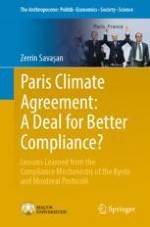2019 | OriginalPaper | Buchkapitel
6. Case Study II: Climate Change
verfasst von : Zerrin Savaşan
Erschienen in: Paris Climate Agreement: A Deal for Better Compliance?
Aktivieren Sie unsere intelligente Suche, um passende Fachinhalte oder Patente zu finden.
Wählen Sie Textabschnitte aus um mit Künstlicher Intelligenz passenden Patente zu finden. powered by
Markieren Sie Textabschnitte, um KI-gestützt weitere passende Inhalte zu finden. powered by
